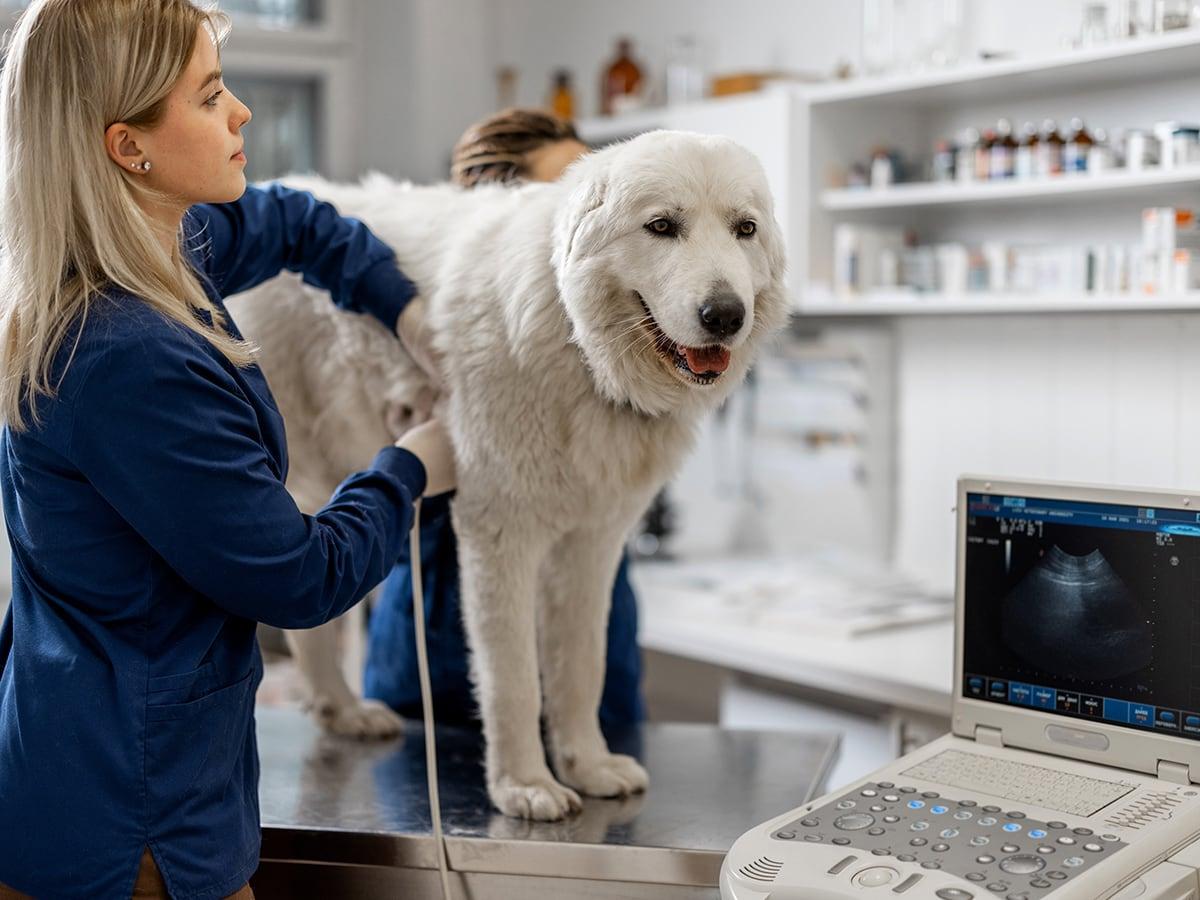Pancreatitis in dogs is a relatively common condition and can be really painful. However, not every dog with pancreatitis is affected in the same way. In this article, we’ll explain the condition and the symptoms that it causes, so that you can spot the signs as soon as possible and get your vet’s advice. We’ll also share information on how pancreatitis is diagnosed, and the treatment options your vet might recommend. Keep reading to find out more.
Breeds commonly affected:
What is pancreatitis in dogs?
Pancreatitis is inflammation of the pancreas gland, which is found in the abdomen, just in front of the stomach. The pancreas has two functions. First, to produce and store enzymes used in digestion, called amylase and lipase, and second, to produce insulin to control blood sugar levels. The inflammation caused by pancreatitis allows the digestive enzymes that are being stored to leak out, causing further damage and inflammation to the gland. In severe cases, the inflammation can spread to the abdominal fat and organs nearby.
What causes pancreatitis in dogs?
There are lots of reasons why a dog might be more likely to get pancreatitis. Firstly, genetics. Small breed dogs, particularly Miniature Schnauzers, Cavalier King Charles Spaniels, and Cocker Spaniels, are prone to developing pancreatitis. But it’s not just small dogs that are at risk, those who are carrying extra weight are also more likely to develop the condition. Sometimes, pancreatitis flare-ups can be due to eating fatty foods or scavenging, but often no specific trigger is found.
What are the symptoms of pancreatitis in dogs?
The symptoms of pancreatitis in dogs include:
However, it’s important to remember that not every dog with pancreatitis will show all of the possible symptoms and mild cases might show no symptoms at all.
How is pancreatitis diagnosed in dogs?
The vet may be suspicious of pancreatitis if your dog is particularly painful in their belly, or if they fail to respond to symptomatic treatment for an upset stomach. If that’s the case, they’ll likely recommend a general blood test initially, to check the overall health of their internal organs, including the liver, kidneys, and pancreas. If this blood test shows they have high levels of the digestive enzymes lipase and amylase, then pancreatitis is more likely. An ultrasound scan or other imaging can be useful to rule out other causes, assess the degree of damage to the pancreas, and check for an underlying cause. A blood test called ‘canine pancreatitis lipase immunoreactivity’ (or cPLI) is more specific. This can be used alongside other test results to make a diagnosis.
What is the treatment for pancreatitis in dogs?
Unfortunately, there is no specific treatment for pancreatitis. Instead, treatment focuses on improving the symptoms and supporting your dog until the inflammation settles. This medication includes pain relief, anti-sickness medications, and gut protectants. Often dogs with pancreatitis need to stay at the vet clinic for a few days, until they’ve stopped vomiting and are more comfortable, eating, and drinking. It’s common for dogs with pancreatitis to become dehydrated because they stop eating and drinking and lose fluid when they vomit. If they are dehydrated, the vet will put them on a fluid drip until they start to eat and drink again. Pancreatitis takes a while to resolve, but once your dog’s symptoms improve, they can continue their recovery at home.
What is the prognosis for dogs with pancreatitis?
Although pancreatitis can cause severe symptoms and take a week or two to resolve, most dogs improve with treatment, as long as there is no underlying problem within the pancreas. In severe cases, damage to the pancreas can be long-term, making future symptoms more likely. Unfortunately, in rare cases, dogs with pancreatitis die despite treatment, but this is more common when the pancreatitis is alongside other health problems.
Summary
Pancreatitis in dogs can cause severe abdominal pain, and dogs can become dehydrated quickly. By watching out for symptoms and letting your vet know when things aren’t right, you’ll be able to get your dog the treatment they need as soon as possible.
About the Author
The article above was written by Dr. Hannah Godfrey, a dedicated veterinarian who aims to make pet care less confusing through her writing. After practicing veterinary medicine for years, she now utilizes her expertise to author articles that help pet owners understand how to best care for their pets. To read more articles written by Dr. Godfrey, visit petsradar.com.

Hannah graduated from the Royal Veterinary College in 2011 and began work straight away at a busy mixed practice. Initially, she treated all species, but focused on small animals from 2014. She has a passion for soft tissue surgery, ultrasound, and canine and feline dentistry, having completed additional training in these areas.
In 2018, Hannah began working at a smaller, independent practice close to home, in order to devote more time to her other loves – writing comedy fiction and spending time with her young family. She now spreads herself across clinical and non-clinical veterinary roles, including working as a locum vet, being Community Lead for a team of Human Factors trainers, and using her writing skills to help educate and inform pet owners.












